新编大学英语外研社第二册译文
新编大学英语第二册1-7单元课文翻译及课后答案
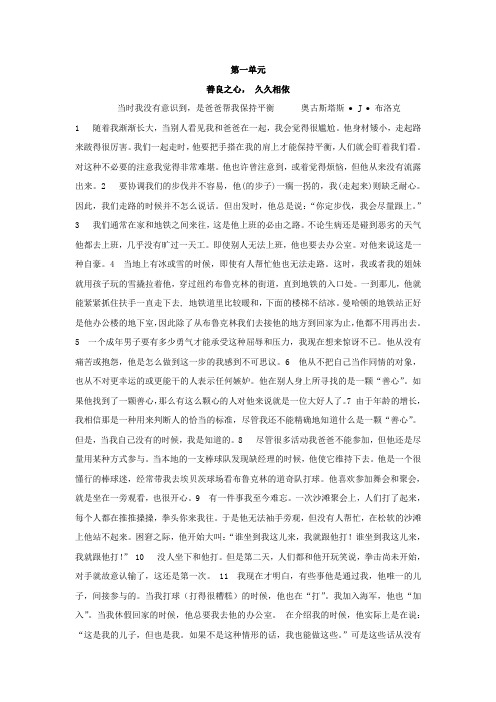
第一单元善良之心,久久相依当时我没有意识到,是爸爸帮我保持平衡奥古斯塔斯• J •布洛克1 随着我渐渐长大,当别人看见我和爸爸在一起,我会觉得很尴尬。
他身材矮小,走起路来跛得很厉害。
我们一起走时,他要把手搭在我的肩上才能保持平衡,人们就会盯着我们看。
对这种不必要的注意我觉得非常难堪。
他也许曾注意到,或着觉得烦恼,但他从来没有流露出来。
2 要协调我们的步伐并不容易,他(的步子)一瘸一拐的,我(走起来)则缺乏耐心。
因此,我们走路的时候并不怎么说话。
但出发时,他总是说:“你定步伐,我会尽量跟上。
”3 我们通常在家和地铁之间来往,这是他上班的必由之路。
不论生病还是碰到恶劣的天气他都去上班,几乎没有旷过一天工。
即使别人无法上班,他也要去办公室。
对他来说这是一种自豪。
4 当地上有冰或雪的时候,即使有人帮忙他也无法走路。
这时,我或者我的姐妹就用孩子玩的雪撬拉着他,穿过纽约布鲁克林的街道,直到地铁的入口处。
一到那儿,他就能紧紧抓住扶手一直走下去, 地铁道里比较暖和,下面的楼梯不结冰。
曼哈顿的地铁站正好是他办公楼的地下室,因此除了从布鲁克林我们去接他的地方到回家为止,他都不用再出去。
5 一个成年男子要有多少勇气才能承受这种屈辱和压力,我现在想来惊讶不已。
他从没有痛苦或抱怨,他是怎么做到这一步的我感到不可思议。
6 他从不把自己当作同情的对象,也从不对更幸运的或更能干的人表示任何嫉妒。
他在别人身上所寻找的是一颗“善心”。
如果他找到了一颗善心,那么有这么颗心的人对他来说就是一位大好人了。
7 由于年龄的增长,我相信那是一种用来判断人的恰当的标准,尽管我还不能精确地知道什么是一颗“善心”。
但是,当我自己没有的时候,我是知道的。
8 尽管很多活动我爸爸不能参加,但他还是尽量用某种方式参与。
当本地的一支棒球队发现缺经理的时候,他使它维持下去。
他是一个很懂行的棒球迷,经常带我去埃贝茨球场看布鲁克林的道奇队打球。
他喜欢参加舞会和聚会,就是坐在一旁观看,也很开心。
新编大学英语第二册课文翻译

Unit 1 善良之心,久久相依当时我没有意识到,是爸爸帮我保持平衡奥古斯塔斯? J ? 布洛克1 随着我渐渐长大,当别人看见我和爸爸在一起,我会觉得很尴尬。
他身材矮小,走起路来跛得很厉害。
我们一起走时,他要把手搭在我的肩上才能保持平衡,人们就会盯着我们看。
对这种不必要的注意我觉得非常难堪。
他也许曾注意到,或着觉得烦恼,但他从来没有流露出来。
2 要协调我们的步伐并不容易,他(的步子)一瘸一拐的,我(走起来)则缺乏耐心。
因此,我们走路的时候并不怎么说话。
但出发时,他总是说:“你定步伐,我会尽量跟上。
”3 我们通常在家和地铁之间来往,这是他上班的必由之路。
不论生病还是碰到恶劣的天气他都去上班,几乎没有旷过一天工。
即使别人无法上班,他也要去办公室。
对他来说这是一种自豪。
4 当地上有冰或雪的时候,即使有人帮忙他也无法走路。
这时,我或者我的姐妹就用孩子玩的雪撬拉着他,穿过纽约布鲁克林的街道,直到地铁的入口处。
一到那儿,他就能紧紧抓住扶手一直走下去, 地铁道里比较暖和,下面的楼梯不结冰。
曼哈顿的地铁站正好是他办公楼的地下室,因此除了从布鲁克林我们去接他的地方到回家为止,他都不用再出去。
5 一个成年男子要有多少勇气才能承受这种屈辱和压力,我现在想来惊讶不已。
他从没有痛苦或抱怨,他是怎么做到这一步的我感到不可思议。
6 他从不把自己当作同情的对象,也从不对更幸运的或更能干的人表示任何嫉妒。
他在别人身上所寻找的是一颗“善心”。
如果他找到了一颗善心,那么有这么颗心的人对他来说就是一位大好人了。
7 由于年龄的增长,我相信那是一种用来判断人的恰当的标准,尽管我还不能精确地知道什么是一颗“善心”。
但是,当我自己没有的时候,我是知道的。
8 尽管很多活动我爸爸不能参加,但他还是尽量用某种方式参与。
当本地的一支棒球队发现缺经理的时候,他使它维持下去。
他是一个很懂行的棒球迷,经常带我去埃贝茨球场看布鲁克林的道奇队打球。
他喜欢参加舞会和聚会,就是坐在一旁观看,也很开心。
新编大学英语2课文全部翻译
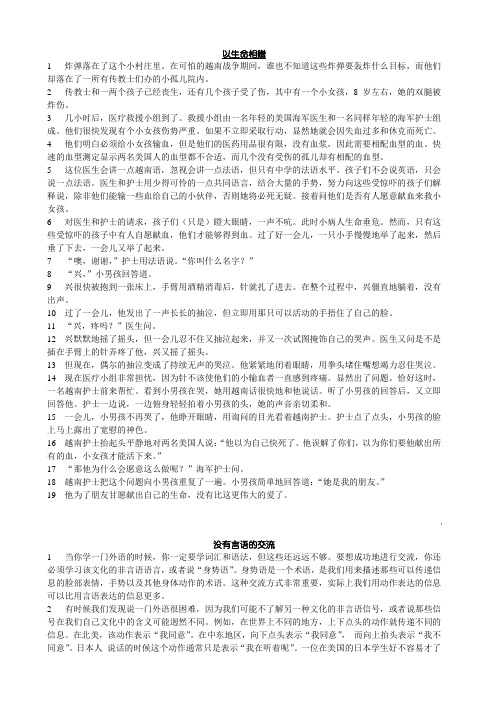
以生命相赠1 炸弹落在了这个小村庄里。
在可怕的越南战争期间,谁也不知道这些炸弹要轰炸什么目标,而他们却落在了一所有传教士们办的小孤儿院内。
2 传教士和一两个孩子已经丧生,还有几个孩子受了伤,其中有一个小女孩,8岁左右,她的双腿被炸伤。
3 几小时后,医疗救援小组到了。
救援小组由一名年轻的美国海军医生和一名同样年轻的海军护士组成。
他们很快发现有个小女孩伤势严重。
如果不立即采取行动,显然她就会因失血过多和休克而死亡。
4 他们明白必须给小女孩输血,但是他们的医药用品很有限,没有血浆,因此需要相配血型的血。
快速的血型测定显示两名美国人的血型都不合适,而几个没有受伤的孤儿却有相配的血型。
5 这位医生会讲一点越南语,忽视会讲一点法语,但只有中学的法语水平。
孩子们不会说英语,只会说一点法语。
医生和护士用少得可怜的一点共同语言,结合大量的手势,努力向这些受惊吓的孩子们解释说,除非他们能输一些血给自己的小伙伴,否则她将必死无疑。
接着问他们是否有人愿意献血来救小女孩。
6 对医生和护士的请求,孩子们(只是)瞪大眼睛,一声不吭。
此时小病人生命垂危。
然而,只有这些受惊吓的孩子中有人自愿献血,他们才能够得到血。
过了好一会儿,一只小手慢慢地举了起来,然后垂了下去,一会儿又举了起来。
7 “噢,谢谢,”护士用法语说。
“你叫什么名字?”8 “兴,”小男孩回答道。
9 兴很快被抱到一张床上,手臂用酒精消毒后,针就扎了进去。
在整个过程中,兴僵直地躺着,没有出声。
10 过了一会儿,他发出了一声长长的抽泣,但立即用那只可以活动的手捂住了自己的脸。
11 “兴,疼吗?”医生问。
12 兴默默地摇了摇头,但一会儿忍不住又抽泣起来,并又一次试图掩饰自己的哭声。
医生又问是不是插在手臂上的针弄疼了他,兴又摇了摇头。
13 但现在,偶尔的抽泣变成了持续无声的哭泣。
他紧紧地闭着眼睛,用拳头堵住嘴想竭力忍住哭泣。
14 现在医疗小组非常担忧,因为针不该使他们的小输血者一直感到疼痛。
Unit 2 Communication Problems新编大学英语第二版第二册课文翻译
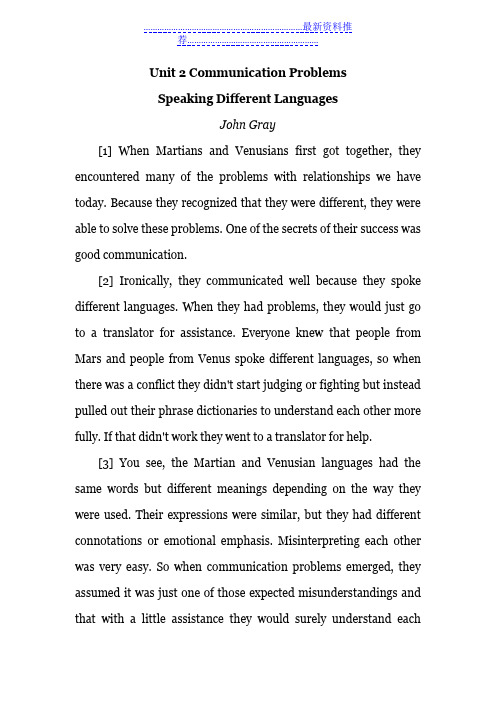
Unit 2 Communication ProblemsSpeaking Different LanguagesJohn Gray[1] When Martians and Venusians first got together, they encountered many of the problems with relationships we have today. Because they recognized that they were different, they were able to solve these problems. One of the secrets of their success was good communication.[2] Ironically, they communicated well because they spoke different languages. When they had problems, they would just go to a translator for assistance. Everyone knew that people from Mars and people from Venus spoke different languages, so when there was a conflict they didn't start judging or fighting but instead pulled out their phrase dictionaries to understand each other more fully. If that didn't work they went to a translator for help.[3] You see, the Martian and Venusian languages had the same words but different meanings depending on the way they were used. Their expressions were similar, but they had different connotations or emotional emphasis. Misinterpreting each other was very easy. So when communication problems emerged, they assumed it was just one of those expected misunderstandings and that with a little assistance they would surely understand eachother. They experienced a trust and acceptance that we rarely experience today.[4] Even today we still need translators. Men and women seldom mean the same things even when they use the same words. For example, when a woman says, “I feel like you never listen,” she does not expect the word “never” to be tak en literally. Using the word “never” is just a way of expressing the frustration she is feeling at the moment. It is not to be taken as if it were factual information.[5] To fully express their feelings, women would tend to exaggerate the facts a little bit for effect and use various superlatives, metaphors, and generalizations. Men mistakenly take these expressions literally. Because they misunderstand the intended meaning, they commonly react in an unsupportive manner. In the following chart ten complaints easily misinterpreted are listed, as well as how a man might respond unsupportively.Ten Common Complaints That Are Easily MisinterpretedWomen say things like this: Men respond like this:“We never go out.” “That's not true. We went out last week.”“Everyone ignores me.” “I'm sure some people notice you.”“I am so tired, I can't do anything.” “If you don't like your job,then quit.”“I want to forget everything.” “I don't think there's anything to forget.”“The house is always a mess.” “It's not always a mess.”“No one listens to me anymore.” “But I'm listening to you right now.”“Nothing is working.” “Are you saying it is my fault?”“You don't love me anymore.” “Of course I do. That's why I'm here.”“We are always in a hurry.” “We are not. Fr iday we were relaxed.”“I want more romance.” “Are you saying I am not romantic?”[6] You can see how a “literal” translation of a woman's words could easily mislead a man who is used to using speech as a means of conveying only facts and information. You can also see how a man's responses might lead to an argument. Unclear and unloving communication is the biggest problem in relationships. The number one complaint women have in relationships is: “I don't feel heard.”[7] Even this complaint is misunderstood and misinterpreted![8] A man's literal translation of “I don't feel heard” leads him to take the woman's complaint lightly. He thinks he has heard herif he can repeat what she has said. A correct translation of a woman saying “I don't feel heard” is: “I feel as though you don't fully understand what I really mean to say or care about how I feel. Would you show me that you are interested in what I have to say?”[9] If a man really understood her complaint, then he would argue less and be able to respond more positively. When men and women are on the verge of arguing, they generally misunderstand each other. At such times, it is important to rethink or translate what they have heard.说着不同的语言1 当火星人和金星人最初相聚时,也遇到了我们目前存在的许多人际关系问题。
Unit7Culture新编大学英语第二版第二册课文翻译
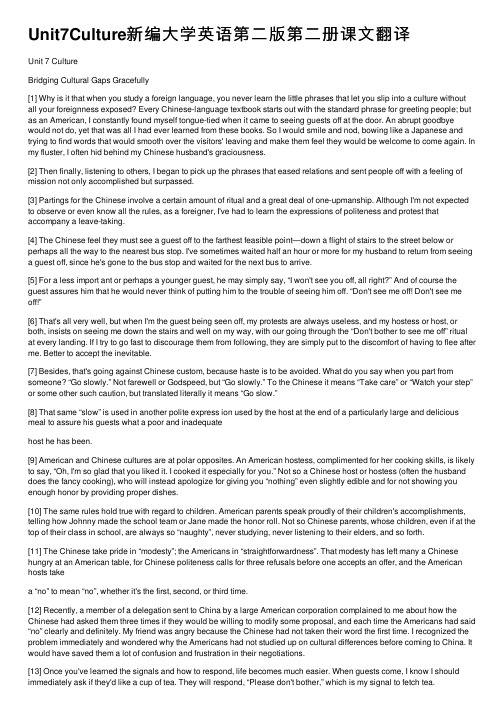
Unit7Culture新编⼤学英语第⼆版第⼆册课⽂翻译Unit 7 CultureBridging Cultural Gaps Gracefully[1] Why is it that when you study a foreign language, you never learn the little phrases that let you slip into a culture without all your foreignness exposed? Every Chinese-language textbook starts out with the standard phrase for greeting people; but as an American, I constantly found myself tongue-tied when it came to seeing guests off at the door. An abrupt goodbye would not do, yet that was all I had ever learned from these books. So I would smile and nod, bowing like a Japanese and trying to find words that would smooth over the visitors' leaving and make them feel they would be welcome to come again. In my fluster, I often hid behind my Chinese husband's graciousness.[2] Then finally, listening to others, I began to pick up the phrases that eased relations and sent people off with a feeling of mission not only accomplished but surpassed.[3] Partings for the Chinese involve a certain amount of ritual and a great deal of one-upmanship. Although I'm not expected to observe or even know all the rules, as a foreigner, I've had to learn the expressions of politeness and protest that accompany a leave-taking.[4] The Chinese feel they must see a guest off to the farthest feasible point—down a flight of stairs to the street below or perhaps all the way to the nearest bus stop. I've sometimes waited half an hour or more for my husband to return from seeinga guest off, since he's gone to the bus stop and waited for the next bus to arrive.[5] For a less import ant or perhaps a younger guest, he may simply say, “I won't see you off, all right?” And of course the guest assures him that he would never think of putting him to the trouble of seeing him off. “Don't see me off! Don't see meoff!”[6] That's all very well, but when I'm the guest being seen off, my protests are always useless, and my hostess or host, or both, insists on seeing me down the stairs and well on my way, with our going through the “Don't bother to see me off” ritual at every landing. If I try to go fast to discourage them from following, they are simply put to the discomfort of having to flee after me. Better to accept the inevitable.[7] Besides, that's going against Chinese custom, because haste is to be avoided. What do you say when you part from someone? “Go slowly.” Not farewell or Godspeed, but “Go slowly.” To the Chinese it means “Take care” or “Watch your step”or some other such caution, but translated literally it means “Go slow.”[8] That same “slow” is used in another polite express ion used by the host at the end of a particularly large and delicious meal to assure his guests what a poor and inadequatehost he has been.[9] American and Chinese cultures are at polar opposites. An American hostess, complimented for her cooking skills, is likely to say, “Oh, I'm so glad that you liked it. I cooked it especially for you.” Not so a Chinese host or hostess (often the husband does the fancy cooking), who will instead apologize for giving you “nothing” even slightly edible and for not showing you enough honor by providing proper dishes.[10] The same rules hold true with regard to children. American parents speak proudly of their children's accomplishments, telling how Johnny made the school team or Jane made the honor roll. Not so Chinese parents, whose children, even if at the top of their class in school, are always so “naughty”, never studying, never listening to their elders, and so forth.[11] The Chinese take pride in “modesty”; the Americans in “straightforwardness”. That modesty has left many a Chinese hungry at an American table, for Chinese politeness calls for three refusals before one accepts an offer, and the American hosts takea “no” to mean “no”, whether it's the first, second, or third time.[12] Recently, a member of a delegation sent to China by a large American corporation complained to me about how the Chinese had asked them three times if they would be willing to modify some proposal, and each time the Americans had said “no” clearly and definitely. My friend was angry because the Chinese had not taken their word the first time. I recognized the problem immediately and wondered why the Americans had not studied up on cultural differences before coming to China. It would have saved them a lot of confusion and frustration in their negotiations.[13] Once you've learned the signals and how to respond, life becomes much easier. When guests come, I know I should immediately ask if they'd like a cup of tea. They will respond, “Please don't bother,” which is my signal to fetch tea.从容得体德跨越⽂化沟壑1 在外语学习中,学会⼀些简单的词组就能让你不知不觉地进⼊另⼀种⽂化,⽽丝毫不暴露你作为⼀个外国⼈的⾝份,但你为什么总是学不会呢?每本汉语课本都,⼀律从问候语开始的。
Unit 4 Psychology in Our Daily Life新编大学英语第二版第二册课文翻译
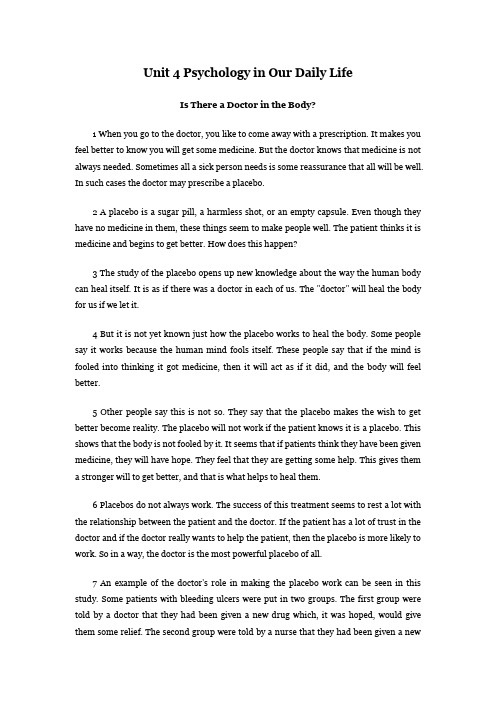
Unit 4 Psychology in Our Daily LifeIs There a Doctor in the Body?1 When you go to the doctor, you like to come away with a prescription. It makes you feel better to know you will get some medicine. But the doctor knows that medicine is not always needed. Sometimes all a sick person needs is some reassurance that all will be well. In such cases the doctor may prescribe a placebo.2 A placebo is a sugar pill, a harmless shot, or an empty capsule. Even though they have no medicine in them, these things seem to make people well. The patient thinks it is medicine and begins to get better. How does this happen?3 The study of the placebo opens up new knowledge about the way the human body can heal itself. It is as if there was a doctor in each of us. The "doctor" will heal the body for us if we let it.4 But it is not yet known just how the placebo works to heal the body. Some people say it works because the human mind fools itself. These people say that if the mind is fooled into thinking it got medicine, then it will act as if it did, and the body will feel better.5 Other people say this is not so. They say that the placebo makes the wish to get better become reality. The placebo will not work if the patient knows it is a placebo. This shows that the body is not fooled by it. It seems that if patients think they have been given medicine, they will have hope. They feel that they are getting some help. This gives them a stronger will to get better, and that is what helps to heal them.6 Placebos do not always work. The success of this treatment seems to rest a lot with the relationship between the patient and the doctor. If the patient has a lot of trust in the doctor and if the doctor really wants to help the patient, then the placebo is more likely to work. So in a way, the doctor is the most powerful placebo of all.7 An example of the doctor's role in making the placebo work can be seen in this study. Some patients with bleeding ulcers were put in two groups. The first group were told by a doctor that they had been given a new drug which, it was hoped, would give them some relief. The second group were told by a nurse that they had been given a newdrug but that not much was known about how it would work. As a result, 70 percent of the people in the first group got much better. Only 25 percent of the people in the second group got better. And both groups had in fact been given the same thing a placebo.8 The placebo has been found to work with a lot of different cases. It helps such things as seasickness, coughs, colds, and even pain after an operation. And there was an experiment done to see if a placebo could help old people stay healthy and live longer.9 The test was done in Romania with 150 people over the age of 60. They were put in three groups with 50 people in each group. The first group were given nothing at all. The second group were given a placebo. The third group were given a real drug and told that it would help with the problems of old age. (In fact, it was not a drug for old age at all.) The three groups were studied for many years. The first group showed no changes from the way old people in that village had always been. The second group (with the placebo) had much better health and a lower death rate. The third group (with the real drug) showed much the same results as the group that took the placebo.10 A placebo can also have bad effects. If patients expect a bad reaction to medicine, then they will also show a bad reaction to the placebo. This would seem to show that a lot of how you react to medicine is in your mind rather than in your body. Some doctors still think that if the placebo can have bad effects it should never be used. They think there is still not enough known about it.11 And yet, the use of the placebo has been well known for hundreds of years in other countries. Tribal doctors in some African countries have known for a long time that patients will get better if they think they are going to. Many of the "treatments" they use do not seem able to make a sick person better, and yet such treatments work.12 The strange power of the placebo does seem to suggest that the human mind is stronger than we think it is. There are people who say you can heal your body by using your mind. And the interesting thing is that even people who swear this is not possible have been healed by a placebo.人体内有医生吗?1 当你去看病时,你总希望走时能拿到一张药方。
Unit 2 Communication Problems新编大学英语第二版第二册课文翻译

Unit 2 Communication ProblemsSpeaking Different LanguagesJohn Gray[1] When Martians and Venusians first got together, they encountered many of the problems with relationships we have today. Because they recognized that they were different, they were able to solve these problems. One of the secrets of their success was good communication.[2] Ironically, they communicated well because they spoke different languages. When they had problems, they would just go to a translator for assistance. Everyone knew that people from Mars and people from Venus spoke different languages, so when there was a conflict they didn't start judging or fighting but instead pulled out their phrase dictionaries to understand each other more fully. If that didn't work they went to a translator for help.[3] You see, the Martian and Venusian languages had the same words but different meanings depending on the way they were used. Their expressions were similar, but they had different connotations or emotional emphasis. Misinterpreting each other was very easy. So when communication problems emerged, they assumed it was just one of those expected misunderstandings and that with a little assistance they would surely understand each other. They experienced a trust and acceptance that we rarely experience today.[4] Even today we still need translators. Men and women seldom mean the same things even when they use the same words. For example, when a woman says, “I feel like you never listen,” she does not expect the word “never” to be tak en literally. Using the word “never” is just a way of expressing the frustration she is feeling at the moment. It is not to be taken as if it were factual information.[5] To fully express their feelings, women would tend to exaggerate the factsa little bit for effect and use various superlatives, metaphors, and generalizations.Men mistakenly take these expressions literally. Because they misunderstand the intended meaning, they commonly react in an unsupportive manner. In the following chart ten complaints easily misinterpreted are listed, as well as how a man might respond unsupportively.Ten Common Complaints That Are Easily MisinterpretedWomen say things like this: Men respond like this:“We never go out.” “That's not true. We went out last week.”“Everyone ignores me.” “I'm sure some people notice you.”“I am so tired, I can't do anything.” “If you don't like your job, then quit.”“I want to forget everything.” “I don't think there's anything to forget.”“The house is always a mess.” “It's not always a mess.”“No one listens to me anymore.” “But I'm listening to you right now.”“Nothing is working.” “Are you saying it is my fault”“You don't love me anymore.” “Of course I do. That's why I'm here.”“We are always in a hurry.” “We are not. Friday we were relaxed.”“I want more romance.” “Are you saying I am not romantic”[6] You can see how a “literal” translation of a woman's words could easily mislead a man who is used to using speech as a means of conveying only facts and information. You can also see how a man's responses might lead to an argument. Unclear and unloving communication is the biggest problem in relationships. The number one complaint women have in relationships is: “I don't feel heard.”[7] Even this complaint is misunderstood and misinterpreted![8] A man's literal translation of “I don't feel heard” leads him to take the woman's complaint lightly. He thinks he has heard her if he can repeat what she has said. A correct translation of a woman saying “I don't feel heard” is:“I feel as though you don't fully understand what I really mean to say or care about how I feel. Would you show me that you are interested in what I have to say”[9] If a man really understood her complaint, then he would argue less and be able to respond more positively. When men and women are on the verge of arguing, they generally misunderstand each other. At such times, it is important to rethink or translate what they have heard.说着不同的语言1 当火星人和金星人最初相聚时,也遇到了我们目前存在的许多人际关系问题。
Unit-1-Love新编大学英语第二版第二册课文翻译
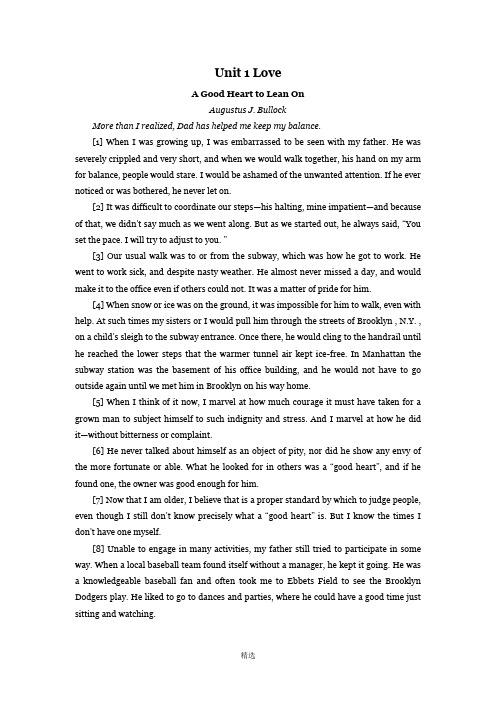
Unit 1 LoveA Good Heart to Lean OnAugustus J. BullockMore than I realized, Dad has helped me keep my balance.[1] When I was growing up, I was embarrassed to be seen with my father. He was severely crippled and very short, and when we would walk together, his hand on my arm for balance, people would stare. I would be ashamed of the unwanted attention. If he ever noticed or was bothered, he never let on.[2] It was difficult to coordinate our steps—his halting, mine impatient—and because of that, we did n't say much as we went along. But as we started out, he always said, “You set the pace. I will try to adjust to you. ”[3] Our usual walk was to or from the subway, which was how he got to work. He went to work sick, and despite nasty weather. He almost never missed a day, and would make it to the office even if others could not. It was a matter of pride for him.[4] When snow or ice was on the ground, it was impossible for him to walk, even with help. At such times my sisters or I would pull him through the streets of Brooklyn , N.Y. , on a child's sleigh to the subway entrance. Once there, he would cling to the handrail until he reached the lower steps that the warmer tunnel air kept ice-free. In Manhattan the subway station was the basement of his office building, and he would not have to go outside again until we met him in Brooklyn on his way home.[5] When I think of it now, I marvel at how much courage it must have taken for a grown man to subject himself to such indignity and stress. And I marvel at how he did it—without bitterness or complaint.[6] He never talked about himself as an object of pity, nor did he show any envy of the more fortunate or able. What he looked for in others was a “good heart”, and if he found one, the owner was good enough for him.[7] Now that I am older, I believe that is a proper standard by which to judge people, even though I still don't know precisely what a “good heart” is. But I know the times I don't have one myself.[8] Unable to engage in many activities, my father still tried to participate in some way. When a local baseball team found itself without a manager, he kept it going. He was a knowledgeable baseball fan and often took me to Ebbets Field to see the Brooklyn Dodgers play. He liked to go to dances and parties, where he could have a good time just sitting and watching.[9] On one memorable occasion a fight broke out at a beach party, with everyone punching and shoving. He wasn't content to sit and watch, but he couldn't stand unaided on the soft sand. In frustration he began to shout, “I'll fight anyone who will sit down with me! I'll fight anyone who will sit down with me! ”[10] Nobody did. But the next day people kidded him by saying it was the first time any fighter was urged to take a dive even before the bout began.[11] I now know he participated in some things vicariously through me, his only son. When I played ball (poorly), he “played” too. When I joined the Navy, he “joined” too. And when I came home on leave, he saw to it that I visited his office. Introducing me, he was really saying, “This is my son, but it is also me, and I could have done this, too, if things had been different. ” Those words were never said aloud.[12] He has been gone many years now, but I think of him often. I wonder if he sensed my reluctance to be seen with him during our walks. If he did, I am sorry I never told him how sorry I was, how unworthy I was, how I regretted it. I think of him when I complain about trifles, when I am envious of another's good fortune, when I don't have a “good heart”.[13] At such times I put my hand on his arm to regain my balance, and say, “You set the pace. I will try to adjust to you.”善良之心,久久相依当时我没有意识到,是爸爸帮我保持平衡奥古斯塔斯• J •布洛克1 随着我渐渐长大,当别人看见我和爸爸在一起,我会觉得很尴尬。
Unit-4-Psychology-in-Our-Daily-Life新编大学英语第二版第二册课文翻译
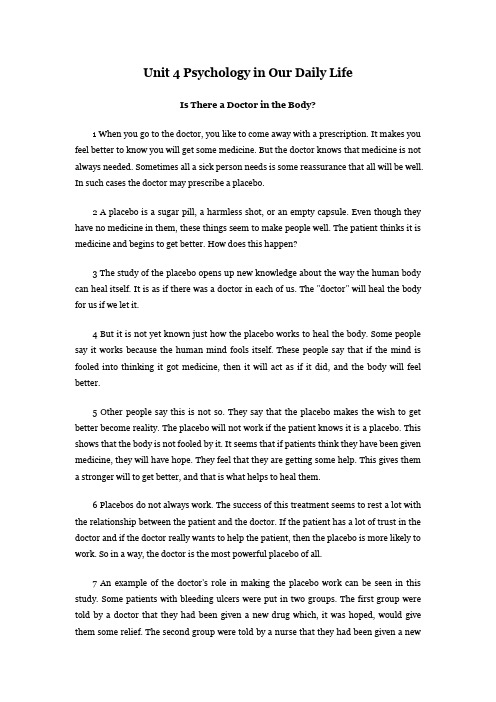
Unit 4 Psychology in Our Daily LifeIs There a Doctor in the Body?1 When you go to the doctor, you like to come away with a prescription. It makes you feel better to know you will get some medicine. But the doctor knows that medicine is not always needed. Sometimes all a sick person needs is some reassurance that all will be well. In such cases the doctor may prescribe a placebo.2 A placebo is a sugar pill, a harmless shot, or an empty capsule. Even though they have no medicine in them, these things seem to make people well. The patient thinks it is medicine and begins to get better. How does this happen?3 The study of the placebo opens up new knowledge about the way the human body can heal itself. It is as if there was a doctor in each of us. The "doctor" will heal the body for us if we let it.4 But it is not yet known just how the placebo works to heal the body. Some people say it works because the human mind fools itself. These people say that if the mind is fooled into thinking it got medicine, then it will act as if it did, and the body will feel better.5 Other people say this is not so. They say that the placebo makes the wish to get better become reality. The placebo will not work if the patient knows it is a placebo. This shows that the body is not fooled by it. It seems that if patients think they have been given medicine, they will have hope. They feel that they are getting some help. This gives them a stronger will to get better, and that is what helps to heal them.6 Placebos do not always work. The success of this treatment seems to rest a lot with the relationship between the patient and the doctor. If the patient has a lot of trust in the doctor and if the doctor really wants to help the patient, then the placebo is more likely to work. So in a way, the doctor is the most powerful placebo of all.7 An example of the doctor's role in making the placebo work can be seen in this study. Some patients with bleeding ulcers were put in two groups. The first group were told by a doctor that they had been given a new drug which, it was hoped, would give them some relief. The second group were told by a nurse that they had been given a newdrug but that not much was known about how it would work. As a result, 70 percent of the people in the first group got much better. Only 25 percent of the people in the second group got better. And both groups had in fact been given the same thing a placebo.8 The placebo has been found to work with a lot of different cases. It helps such things as seasickness, coughs, colds, and even pain after an operation. And there was an experiment done to see if a placebo could help old people stay healthy and live longer.9 The test was done in Romania with 150 people over the age of 60. They were put in three groups with 50 people in each group. The first group were given nothing at all. The second group were given a placebo. The third group were given a real drug and told that it would help with the problems of old age. (In fact, it was not a drug for old age at all.) The three groups were studied for many years. The first group showed no changes from the way old people in that village had always been. The second group (with the placebo) had much better health and a lower death rate. The third group (with the real drug) showed much the same results as the group that took the placebo.10 A placebo can also have bad effects. If patients expect a bad reaction to medicine, then they will also show a bad reaction to the placebo. This would seem to show that a lot of how you react to medicine is in your mind rather than in your body. Some doctors still think that if the placebo can have bad effects it should never be used. They think there is still not enough known about it.11 And yet, the use of the placebo has been well known for hundreds of years in other countries. Tribal doctors in some African countries have known for a long time that patients will get better if they think they are going to. Many of the "treatments" they use do not seem able to make a sick person better, and yet such treatments work.12 The strange power of the placebo does seem to suggest that the human mind is stronger than we think it is. There are people who say you can heal your body by using your mind. And the interesting thing is that even people who swear this is not possible have been healed by a placebo.人体内有医生吗?1 当你去看病时,你总希望走时能拿到一张药方。
(2020年7月整理)新编大学英语第二版Book2 Unit1-4课文原文加翻译.doc
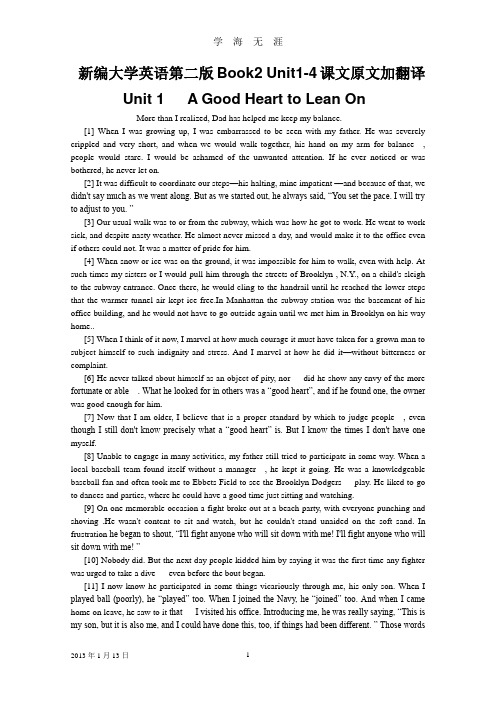
新编大学英语第二版Book2 Unit1-4课文原文加翻译Unit 1 A Good Heart to Lean OnMore than I realized, Dad has helped me keep my balance.[1] When I was growing up, I was embarrassed to be seen with my father. He was severely crippled and very short, and when we would walk together, his hand on my arm for balance , people would stare. I would be ashamed of the unwanted attention. If he ever noticed or was bothered, he never let on.[2] It was difficult to coordinate our steps—his halting, mine impatient —and because of that, we didn't say much as we went along. But as we started out, he always said, “You set the pace. I will try to adjust to you. ”[3] Our usual walk was to or from the subway, which was how he got to work. He went to work sick, and despite nasty weather. He almost never missed a day, and would make it to the office even if others could not. It was a matter of pride for him.[4] When snow or ice was on the ground, it was impossible for him to walk, even with help. At such times my sisters or I would pull him through the streets of Brooklyn , N.Y., on a child's sleigh to the subway entrance. Once there, he would cling to the handrail until he reached the lower steps that the warmer tunnel air kept ice-free.In Manhattan the subway station was the basement of his office building, and he would not have to go outside again until we met him in Brooklyn on his way home..[5] When I think of it now, I marvel at how much courage it must have taken for a grown man to subject himself to such indignity and stress. And I marvel at how he did it—without bitterness or complaint.[6] He never talked about himself as an object of pity, nor did he show any envy of the more fortunate or able . What he looked for in others was a “good heart”, and if he found one, the owner was good enough for him.[7] Now that I am older, I believe that is a proper standard by which to judge people , even though I still don't know precisely what a “good heart” is. But I know the times I don't have one myself.[8] Unable to engage in many activities, my father still tried to participate in some way. When a local baseball team found itself without a manager , he kept it going. He was a knowledgeable baseball fan and often took me to Ebbets Field to see the Brooklyn Dodgers play. He liked to go to dances and parties, where he could have a good time just sitting and watching.[9] On one memorable occasion a fight broke out at a beach party, with everyone punching and shoving .He wasn't content to sit and watch, but he couldn't stand unaided on the soft sand. In frustration he began to shout, “I'll fight anyone who will sit down with me! I'll fight anyone who will sit down with me! ”[10] Nobody did. But the next day people kidded him by saying it was the first time any fighter was urged to take a dive even before the bout began.[11] I now know he participated in some things vicariously through me, his only son. When I played ball (poorly), he “played” too. When I joined the Navy, he “joined” too. And when I came home on leave, he saw to it that I visited his office. Introducing me, he was really saying, “This is my son, but it is also me, and I could have done this, too, if things had been different. ” Those wordswere never said aloud.[12] He has been gone many years now, but I think of him often. I wonder if he sensed my reluctance to be seen with him during our walks. If he did, I am sorry I never told him how sorry I was, how unworthy I was, how I regretted it. I think of him when I complain about trifles, when I am envious of anoth er's good fortune, when I don't have a “good heart”.[13] At such times I put my hand on his arm to regain my balance, and say, “You set the pace. I will try to adjust to you.” ( 703 words)【译文】善良之心,久久相依1 随着我渐渐长大,当别人看见我和爸爸在一起,我会觉得很尴尬。
(完整word版)Unit3BorntoWin新编大学英语第二版第二册课文翻译
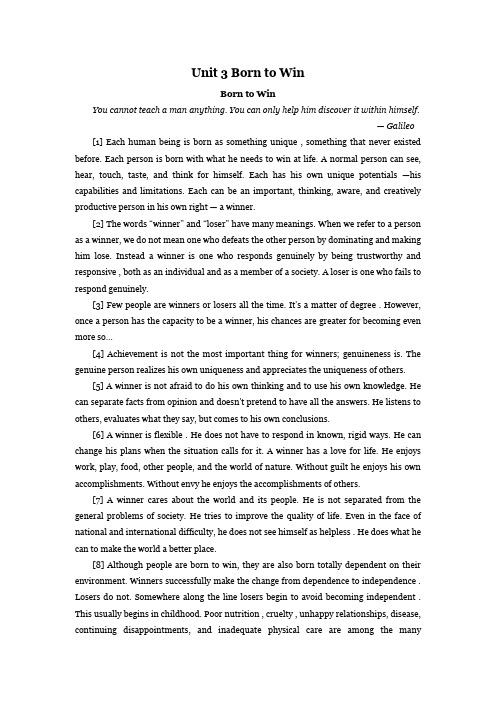
Unit 3 Born to WinBorn to WinYou cannot teach a man anything. You can only help him discover it within himself.— Galileo[1] Each human being is born as something unique , something that never existed before. Each person is born with what he needs to win at life. A normal person can see, hear, touch, taste, and think for himself. Each has his own unique potentials —his capabilities and limitations. Each can be an important, thinking, aware, and creatively productive person in his own right — a winner.[2] The words “winner” and “loser” have many meanings. When we refer to a person as a winner, we do not mean one who defeats the other person by dominating and making him lose. Instead a winner is one who responds genuinely by being trustworthy and responsive , both as an individual and as a member of a society. A loser is one who fails to respond genuinely.[3] Few people are winners or losers all the time. It's a matter of degree . However, once a person has the capacity to be a winner, his chances are greater for becoming even more so…[4] Achievement is not the most important thing for winners; genuineness is. The genuine person realizes his own uniqueness and appreciates the uniqueness of others.[5] A winner is not afraid to do his own thinking and to use his own knowledge. He can separate facts from opinion and doesn't pretend to have all the answers. He listens to others, evaluates what they say, but comes to his own conclusions.[6] A winner is flexible . He does not have to respond in known, rigid ways. He can change his plans when the situation calls for it. A winner has a love for life. He enjoys work, play, food, other people, and the world of nature. Without guilt he enjoys his own accomplishments. Without envy he enjoys the accomplishments of others.[7] A winner cares about the world and its people. He is not separated from the general problems of society. He tries to improve the quality of life. Even in the face of national and international difficulty, he does not see himself as helpless . He does what he can to make the world a better place.[8] Although people are born to win, they are also born totally dependent on their environment. Winners successfully make the change from dependence to independence . Losers do not. Somewhere along the line losers begin to avoid becoming independent . This usually begins in childhood. Poor nutrition , cruelty , unhappy relationships, disease, continuing disappointments, and inadequate physical care are among the manyexperiences that contribute to making people losers.[9] A loser is held back by his low capacity to appropriately express himself through a full range of possible behavior. He may be unaware of other choices for his life if the path he chooses goes nowhere. He is afraid to try new things. He repeats not only his own mistakes and often repeats those of his family and culture.[10] A loser has difficulty giving and receiving love. He does not enter into close, honest, direct relationships with others. Instead, he tries to manipulate them into living up to his expectations and channels his energies into living up to their expectations.生而成功任何事都不可能由别人来教你,只能在别人的帮助下靠自己去发现。
Unit1Love新编大学英语第二版第二册课文翻译分解
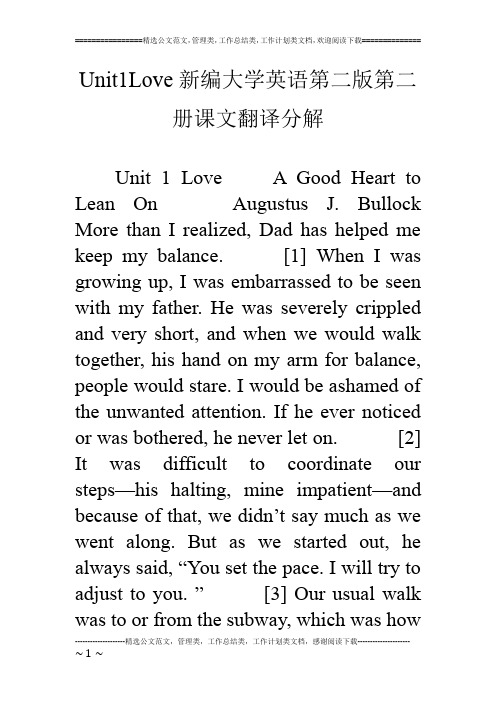
Unit1Love新编大学英语第二版第二册课文翻译分解Unit 1 Love A Good Heart to Lean On Augustus J. Bullock More than I realized, Dad has helped me keep my balance. [1] When I was growing up, I was embarrassed to be seen with my father. He was severely crippled and very short, and when we would walk together, his hand on my arm for balance, people would stare. I would be ashamed of the unwanted attention. If he ever noticed or was bothered, he never let on. [2] It was difficult to coordinate our steps—his halting, mine impatient—and because of that, we didn’t say much as we went along. But as we started out, he always said, “You set the pace. I will try to adjust to you. ” [3] Our usual walk was to or from the subway, which was howhe got to work. He went to work sick, and despite nasty weather. He almost never missed a day, and would make it to the office even if others could not. It was a matter of pride for him. [4] When snow or ice was on the ground, it was impossible for him to walk, even with help. At such times my sisters or I would pull him through the streets of Brooklyn , , on a child’s sleigh to the subway entrance. Once there, he would cling to the handrail until he reached the lower steps that the warmer tunnel air kept ice-free. In Manhattan the subway station was the basement of his office building, and he would not have to go outside again until we met him in Brooklyn on his way home.[5] When I think of it now, I marvel at how much courage it must have taken for a grown man to subject himself to such indignity and stress. And I marvel at how he did it—without bitterness or complaint.[6] He never talked about himself as an object of pity, nor did he show any envy of the more fortunate or able. What he looked for in others was a “good heart”, and if he found one, the owner was good enough for him. [7] Now that I am older, I believe that is a proper standard by which to judge people, even though I still don’t know precisely what a “good heart” is. ButI know the times I don’t have one mysel f.[8] Unable to engage in many activities, my father still tried to participate in some way. When a local baseball team found itself without a manager, he kept it going. He was a knowledgeable baseball fan and often took me to Ebbets Field to see the Brooklyn Dodgers play. He liked to go to dances and parties, where he could have a good time just sitting and watching.[9] On one memorable occasion a fight broke out at a beach party, with everyone punching and shoving. He wasn’t contentto sit and wat ch, but he couldn’t stand unaided on the soft sand. In frustration he began to shout, “I’ll fight anyone who will sit down with me! I’ll fight anyone who will sit down with me! ” [10] Nobody did. But the next day people kidded him by saying it was the first time any fighter was urged to take a dive even before the bout began. [11] I now know he participated in some things vicariously through me, his only son. When I played ball (poorly), he “played” too. When I joined the Navy, he “joined” too. And when I came home on leave, he saw to it that I visited his office. Introducing me, he was really saying, “This is my son, but it is also me, and I could have done this, too, if things had been different. ” Those words were never said aloud. [12] He has been gone many years now, but I think of him often. I wonder if he sensed my reluctance to beseen with him during our walks. If he did, I am sorry I never told him how sorry I was, how unworthy I was, how I regretted it. I think of him when I complain about trifles, when I am envious of another’s good fortune, when I don’t have a “good heart”. [13] At such times I put my hand on his arm to regain my balance, and say, “You set the pace. I will try to adjust to you.” 善良之心,久久相依当时我没有意识到,是爸爸帮我保持平衡奥古斯塔斯? J ? 布洛克1 随着我渐渐长大,当别人看见我和爸爸在一起,我会觉得很尴尬。
Unit 8 Money新编大学英语第二版第二册课文翻译
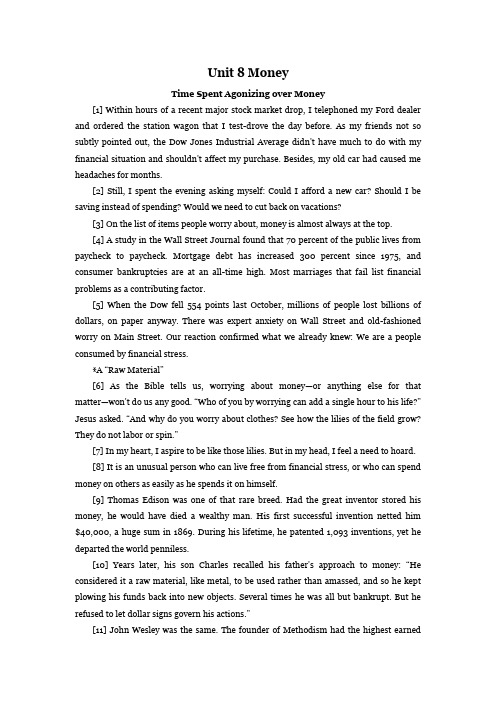
Unit 8 MoneyTime Spent Agonizing over Money[1] Within hours of a recent major stock market drop, I telephoned my Ford dealer and ordered the station wagon that I test-drove the day before. As my friends not so subtly pointed out, the Dow Jones Industrial Average didn't have much to do with my financial situation and shouldn't affect my purchase. Besides, my old car had caused me headaches for months.[2] Still, I spent the evening asking myself: Could I afford a new car? Should I be saving instead of spending? Would we need to cut back on vacations?[3] On the list of items people worry about, money is almost always at the top.[4] A study in the Wall Street Journal found that 70 percent of the public lives from paycheck to paycheck. Mortgage debt has increased 300 percent since 1975, and consumer bankruptcies are at an all-time high. Most marriages that fail list financial problems as a contributing factor.[5] When the Dow fell 554 points last October, millions of people lost billions of dollars, on paper anyway. There was expert anxiety on Wall Street and old-fashioned worry on Main Street. Our reaction confirmed what we already knew: We are a people consumed by financial stress.*A “Raw Material”[6] As the Bible tells us, worrying about money—or anything else for that matter—won't do us any good. “Who of you by worrying can add a single hour to his life?” Jesus asked. “And why do you worry about clothes? See how the lilies of the field grow? They do not labor or spin.”[7] In my heart, I aspire to be like those lilies. But in my head, I feel a need to hoard.[8] It is an unusual person who can live free from financial stress, or who can spend money on others as easily as he spends it on himself.[9] Thomas Edison was one of that rare breed. Had the great inventor stored his money, he would have died a wealthy man. His first successful invention netted him $40,000, a huge sum in 1869. During his lifetime, he patented 1,093 inventions, yet he departed the world penniless.[10] Years later, his son C harles recalled his father's approach to money: “He considered it a raw material, like metal, to be used rather than amassed, and so he kept plowing his funds back into new objects. Several times he was all but bankrupt. But he refused to let dollar signs govern his actions.”[11] John Wesley was the same. The founder of Methodism had the highest earnedincome in 18th century England, but he gave it all away. His philosophy about money was simple: “Earn all you can, save all you can, give all you can.”*Root of Evil?[12] Money may not be the root of all evil, but if it keeps us up at night, it has become way too important in our lives.[13] That was the lesson of Leo Tolstoy's tale “Elias”, which told of a rich farm couple who lost all their money and were forced to take jobs as servants.[14] A guest one day asked the wife if she was miserable being poor, especially in light of the great wealth she had once enjoyed. The woman's answer—that she was happier than ever before—surprised the visitor.[15] “W hen we were rich, my husband and I had so many cares that we had no time to talk to one another, or to think of our souls, or to pray to God,” the wife explained. “We lay awake at night worrying, lest the ewes should lie on their lambs, and we got up again and again to see that all was well... Now, when my husband and I wake in the morning, we always greet each other in love and harmony. We live peacefully, having nothing to worry about.”[16] For most of us, financial security is an elusive goal. No matter how much we have, it's not enough. Kahlil Gibran put it this way: “The fear of need, when the pantry is full, is the thirst that can not be satisfied.”[17] When the stock market falls, we can panic, hoard, and worry if we have enough. Or we can take a deep breath and remember: Money is merely a raw material to be plowed back into something else.把时间花在为钱苦恼上1 最近一次股市大跌后的几个小时内,我就打电话给我的福特汽车商,订购了我前一天试开过的旅行车。
(完整word版)Unit3BorntoWin新编大学英语第二版第二册课文翻译

Unit 3 Born to WinBorn to WinYou cannot teach a man anything. You can only help him discover it within himself.— Galileo[1] Each human being is born as something unique , something that never existed before. Each person is born with what he needs to win at life. A normal person can see, hear, touch, taste, and think for himself. Each has his own unique potentials —his capabilities and limitations. Each can be an important, thinking, aware, and creatively productive person in his own right — a winner.[2] The words “winner” and “loser” have many meanings. When we refer to a person as a winner, we do not mean one who defeats the other person by dominating and making him lose. Instead a winner is one who responds genuinely by being trustworthy and responsive , both as an individual and as a member of a society. A loser is one who fails to respond genuinely.[3] Few people are winners or losers all the time. It's a matter of degree . However, once a person has the capacity to be a winner, his chances are greater for becoming even more so…[4] Achievement is not the most important thing for winners; genuineness is. The genuine person realizes his own uniqueness and appreciates the uniqueness of others.[5] A winner is not afraid to do his own thinking and to use his own knowledge. He can separate facts from opinion and doesn't pretend to have all the answers. He listens to others, evaluates what they say, but comes to his own conclusions.[6] A winner is flexible . He does not have to respond in known, rigid ways. He can change his plans when the situation calls for it. A winner has a love for life. He enjoys work, play, food, other people, and the world of nature. Without guilt he enjoys his own accomplishments. Without envy he enjoys the accomplishments of others.[7] A winner cares about the world and its people. He is not separated from the general problems of society. He tries to improve the quality of life. Even in the face of national and international difficulty, he does not see himself as helpless . He does what he can to make the world a better place.[8] Although people are born to win, they are also born totally dependent on their environment. Winners successfully make the change from dependence to independence . Losers do not. Somewhere along the line losers begin to avoid becoming independent . This usually begins in childhood. Poor nutrition , cruelty , unhappy relationships, disease, continuing disappointments, and inadequate physical care are among the manyexperiences that contribute to making people losers.[9] A loser is held back by his low capacity to appropriately express himself through a full range of possible behavior. He may be unaware of other choices for his life if the path he chooses goes nowhere. He is afraid to try new things. He repeats not only his own mistakes and often repeats those of his family and culture.[10] A loser has difficulty giving and receiving love. He does not enter into close, honest, direct relationships with others. Instead, he tries to manipulate them into living up to his expectations and channels his energies into living up to their expectations.生而成功任何事都不可能由别人来教你,只能在别人的帮助下靠自己去发现。
新编大学英语book2课后句子翻译
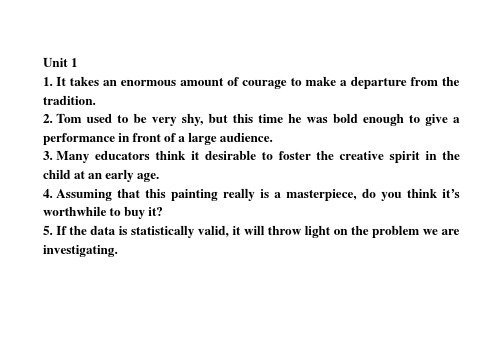
Unit 11.It takes an enormous amount of courage to make a departure from the tradition.2.Tom used to be very shy, but this time he was bold enough to give a performance in front of a large audience.3.Many educators think it desirable to foster the creative spirit in the child at an early age.4.Assuming that this painting really is a masterpiece, do you think it’s worthwhile to buy it?5.If the data is statistically valid, it will throw light on the problem we are investigating.Unit 21.The company denied that its donations had a commercial purpose.2.Whenever he was angry, he would stammer slightly.cation is the most cherished tradition in our family. That’s why my parents never took me to dinner at expensive restaurant, but sent me to the best private school.4.Shortly after he recovered, he lost his job and thus had to go through a difficult period of time.5. In contrast to our affluent neighbors, our parents are poor, but theyhave always tried hard to meet our minimal needs.Unit 41.Research shows that laughter can bring a lot of health benefits.2.A slow Internet connection speed is really annoying.3.As the law stands, helping someone commit suicide is a crime.4.In her report, Mary tries to interpret the data from a completely different angle.5.Sue is a girl of great talent. Her amazing memory sets her apart from her classmates.Unit 51.It is the creativity and dedication of the workers and executives that turned the company into a profitable business.2.The prices of food and medicine have soared in the past three months.3.We plan to repaint the upper floors of the office building.4.His success shows that popularity and artistic merit sometimes coincide.5.I don’t want to see my beloved grandmother lying in a hospital bed and groaning painfully.Unit 61.He is a man of few words, but when it comes to playing computer games, he is too clever for his classmates.2.Children who don’t know any better may think these animals are pretty cute and start playing with them.3.There is no way to obtain a loan, so to buy the new equipment, I’ll just have to grit my teeth and sell my hybrid car.4.The hunter would have fired the shots if he had not seen a herd of elephants coming towards his campsite.5.I find it ironic that Tom has a selective memory--he does not seem to remember painful experiences in the past, particularly those of his own doing.Unit 7Part II. Translation1.M any small business have sprung up in the city since the new policy went into effect.2.O n hearing the news, she smiled briefly, and then returned to her habitual frown.3.H e paused for effect,then said: “We can reach these markets through new channels.”4.T he addition of a concert hall to the school will help it nourish young musical talents.5.W e can’t protect our personal liberties unless we, first of all, establish a sovereign state.6.Y ou must be mistaken. __________(就我所知),Steve did not make those document.7.______________(我们没有实现目标)。
新编大学英语第二册课后翻译答案
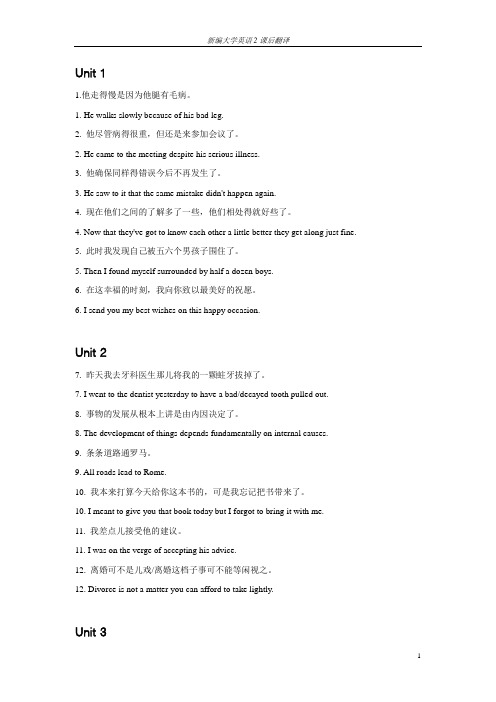
Unit 11.他走得慢是因为他腿有毛病。
1. He walks slowly because of his bad leg.2. 他尽管病得很重,但还是来参加会议了。
2. He came to the meeting despite his serious illness.3. 他确保同样得错误今后不再发生了。
3. He saw to it that the same mistake didn't happen again.4. 现在他们之间的了解多了一些,他们相处得就好些了。
4. Now that they've got to know each other a little better they get along just fine.5. 此时我发现自己被五六个男孩子围住了。
5. Then I found myself surrounded by half a dozen boys.6. 在这幸福的时刻,我向你致以最美好的祝愿。
6. I send you my best wishes on this happy occasion.Unit 27. 昨天我去牙科医生那儿将我的一颗蛀牙拔掉了。
7. I went to the dentist yesterday to have a bad/decayed tooth pulled out.8. 事物的发展从根本上讲是由内因决定了。
8. The development of things depends fundamentally on internal causes.9. 条条道路通罗马。
9. All roads lead to Rome.10. 我本来打算今天给你这本书的,可是我忘记把书带来了。
10. I meant to give you that book today but I forgot to bring it with me.11. 我差点儿接受他的建议。
新编大学英语第二版第2册课文翻译
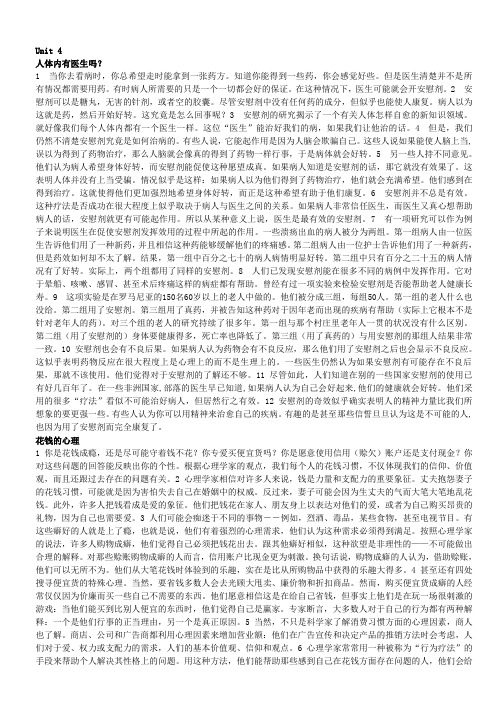
Unit 4人体内有医生吗?1 当你去看病时,你总希望走时能拿到一张药方。
知道你能得到一些药,你会感觉好些。
但是医生清楚并不是所有情况都需要用药。
有时病人所需要的只是一个一切都会好的保证。
在这种情况下,医生可能就会开安慰剂。
2 安慰剂可以是糖丸,无害的针剂,或者空的胶囊。
尽管安慰剂中没有任何药的成分,但似乎也能使人康复。
病人以为这就是药,然后开始好转。
这究竟是怎么回事呢?3 安慰剂的研究揭示了一个有关人体怎样自愈的新知识领域。
就好像我们每个人体内都有一个医生一样。
这位“医生”能治好我们的病,如果我们让他治的话。
4 但是,我们仍然不清楚安慰剂究竟是如何治病的。
有些人说,它能起作用是因为人脑会欺骗自己。
这些人说如果能使人脑上当, 误以为得到了药物治疗,那么人脑就会像真的得到了药物一样行事,于是病体就会好转。
5 另一些人持不同意见。
他们认为病人希望身体好转,而安慰剂能促使这种愿望成真。
如果病人知道是安慰剂的话,那它就没有效果了。
这表明人体并没有上当受骗。
情况似乎是这样:如果病人以为他们得到了药物治疗,他们就会充满希望。
他们感到在得到治疗。
这就使得他们更加强烈地希望身体好转,而正是这种希望有助于他们康复。
6 安慰剂并不总是有效。
这种疗法是否成功在很大程度上似乎取决于病人与医生之间的关系。
如果病人非常信任医生,而医生又真心想帮助病人的话,安慰剂就更有可能起作用。
所以从某种意义上说,医生是最有效的安慰剂。
7 有一项研究可以作为例子来说明医生在促使安慰剂发挥效用的过程中所起的作用。
一些溃疡出血的病人被分为两组。
第一组病人由一位医生告诉他们用了一种新药,并且相信这种药能够缓解他们的疼痛感。
第二组病人由一位护士告诉他们用了一种新药,但是药效如何却不太了解。
结果,第一组中百分之七十的病人病情明显好转。
第二组中只有百分之二十五的病人情况有了好转。
实际上,两个组都用了同样的安慰剂。
8 人们已发现安慰剂能在很多不同的病例中发挥作用。
Unit 10 Emotions and Health新编大学英语第二版第二册课文翻译
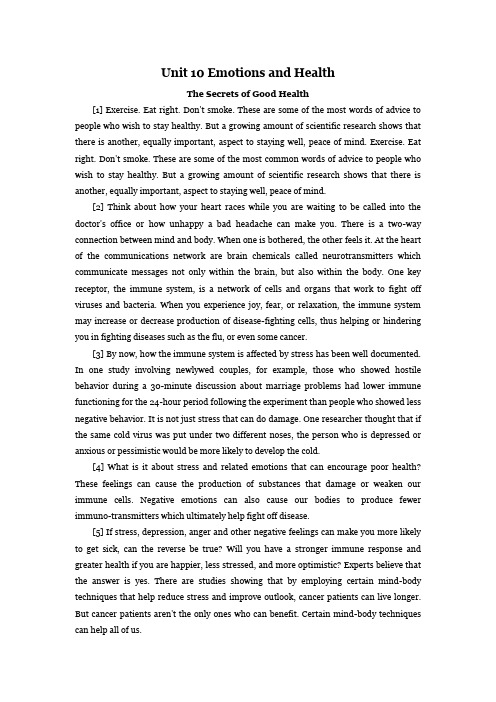
Unit 10 Emotions and HealthThe Secrets of Good Health[1] Exercise. Eat right. Don't smoke. These are some of the most words of advice to people who wish to stay healthy. But a growing amount of scientific research shows that there is another, equally important, aspect to staying well, peace of mind. Exercise. Eat right. Don't smoke. These are some of the most common words of advice to people who wish to stay healthy. But a growing amount of scientific research shows that there is another, equally important, aspect to staying well, peace of mind.[2] Think about how your heart races while you are waiting to be called into the doctor's office or how unhappy a bad headache can make you. There is a two-way connection between mind and body. When one is bothered, the other feels it. At the heart of the communications network are brain chemicals called neurotransmitters which communicate messages not only within the brain, but also within the body. One key receptor, the immune system, is a network of cells and organs that work to fight off viruses and bacteria. When you experience joy, fear, or relaxation, the immune system may increase or decrease production of disease-fighting cells, thus helping or hindering you in fighting diseases such as the flu, or even some cancer.[3] By now, how the immune system is affected by stress has been well documented. In one study involving newlywed couples, for example, those who showed hostile behavior during a 30-minute discussion about marriage problems had lower immune functioning for the 24-hour period following the experiment than people who showed less negative behavior. It is not just stress that can do damage. One researcher thought that if the same cold virus was put under two different noses, the person who is depressed or anxious or pessimistic would be more likely to develop the cold.[4] What is it about stress and related emotions that can encourage poor health? These feelings can cause the production of substances that damage or weaken our immune cells. Negative emotions can also cause our bodies to produce fewer immuno-transmitters which ultimately help fight off disease.[5] If stress, depression, anger and other negative feelings can make you more likely to get sick, can the reverse be true? Will you have a stronger immune response and greater health if you are happier, less stressed, and more optimistic? Experts believe that the answer is yes. There are studies showing that by employing certain mind-body techniques that help reduce stress and improve outlook, cancer patients can live longer. But cancer patients aren't the only ones who can benefit. Certain mind-body techniques can help all of us.[6] Research has found that when patients with chronic pain used relaxation therapies and other behavioral techniques to manage discomfort, they reduced their visits to the doctor by 36 percent. Relaxation produces better health through deep, rhythmic breathing, muscle loosening, and a slower heart rate. When some of the tension is taken out of the body, the strain is taken off the entire system. Relaxation decreases blood pressure, heart rate and respiration and increases one's sense of well-being. That is important because a body that is constantly tense will eventually give out.[7] There are dozens of mind-body techniques for you to choose from. The key is to find one you're comfortable with and then do it regularly. Simply writing about negative, unpleasant events may actually boost your immunity according to researchers. Scientists are not completely sure why it works but they know that when individuals write, it helps them organize events, which in turn gives them more understanding of the situation. When you can give a stressful experience meaning through writing, you don't think about it or worry about it as much. And when you reduce stress, you boost immune functioning. How much you write or how long you write depends upon how much stress you feel about the event. One doctor suggests that people write until they are tired of writing and then read over what they have written. This helps make more sense of it. Also, just talking about a stressful experience with a friend can have the same positive effect.[8] Study after study has shown that people with good support systems—caring, helpful family, friends and co-workers—have better health. Researchers think that the understanding we get from them reduces stress, which in turn helps the immune system. As one psychologist states, “When you have someone who loves you and cares about you to share your problems and feel ings with, you don’t feel you have to fight your problems, or the world, alone.” Another interesting study has shown that the more diverse your social network, the better, that people who have a number of different social relationships have a lower risk of getting colds than those with fewer.[9] There are other fast but effective mind-body relaxation techniques. One could be called “belly breathing”. Sit in a comfortable chair in a quiet room. Close your eyes. Breathe through your nose, fill your belly with air, then slowly release the breath through your mouth. Another technique could be called “mindfulness”. Take a slow walk and be aware of exactly what is happening to you at each moment—whether the wind is on your face, an insect is flying near you, or you hear birds singing. Even if you continue thinking about problems, you will become calmer and distance yourself from your problems. If you are at home, you might dance. Put on some fast music, close the door, and let yourself go. The dancing will energize you and that alone will make you feel better.[10] Whichever mind-body techniques work best for you, never rely on them and them alone to keep you mentally and physically well. Like exercise, good nutrition and proper medical care, methods such as relaxation therapies are only one part of the recipe for good health. Still, they are an important ingredient.健康的秘诀1 锻炼身体,饮食适当,不吸烟。
- 1、下载文档前请自行甄别文档内容的完整性,平台不提供额外的编辑、内容补充、找答案等附加服务。
- 2、"仅部分预览"的文档,不可在线预览部分如存在完整性等问题,可反馈申请退款(可完整预览的文档不适用该条件!)。
- 3、如文档侵犯您的权益,请联系客服反馈,我们会尽快为您处理(人工客服工作时间:9:00-18:30)。
1-4 单元重点课文翻译(好像没有3单元)
善良之心,久久相依 当时我没有意识到,是爸爸帮我保持平衡 奥古斯塔斯· J· 布洛克
1 随着我渐渐长大,当别人看见我和爸爸在一起,我会觉得很尴尬。他身材矮小,走起路来跛得很厉害。我们一起走时,他要把手搭在我的肩上才能保持平衡,人们就会盯着我们看。对这种不必要的注意我觉得非常难堪。他也许曾注意到,或着觉得烦恼,但他从来没有流露出来。2 要协调我们的步伐并不容易,他(的步子)一瘸一拐的,我(走起来)则缺乏耐心。因此,我们走路的时候并不怎么说话。但出发时,他总是说:“你定步伐,我会尽量跟上。”3 我们通常在家和地铁之间来往,这是他上班的必由之路。不论生病还是碰到恶劣的天气他都去上班,几乎没有旷过一天工。即使别人无法上班,他也要去办公室。对他来说这是一种自豪。4 当地上有冰或雪的时候,即使有人帮忙他也无法走路。这时,我或者我的姐妹就用孩子玩的雪撬拉着他,穿过纽约布鲁克林的街道,直到地铁的入口处。一到那儿,他就能紧紧抓住扶手一直走下去, 地铁道里比较暖和,下面的楼梯不结冰。曼哈顿的地铁站正好是他办公楼的地下室,因此除了从布鲁克林我们去接他的地方到回家为止,他都不用再出去。5 一个成年男子要有多少勇气才能承受这种屈辱和压力,我现在想来惊讶不已。他从没有痛苦或抱怨,他是怎么做到这一步的我感到不可思议。6 他从不把自己当作同情的对象,也从不对更幸运的或更能干的人表示任何嫉妒。他在别人身上所寻找的是一颗“善心”。如果他找到了一颗善心,那么有这么颗心的人对他来说就是一位大好人了。7 由于年龄的增长,我相信那是一种用来判断人的恰当的标准,尽管我还不能精确地知道什么是一颗“善心”。但是,当我自己没有的时候,我是知道的。8 尽管很多活动我爸爸不能参加,但他还是尽量用某种方式参与。当本地的一支棒球队发现缺经理的时候,他使它维持下去。他是一个很懂行的棒球迷,经常带我去埃贝茨球场看布鲁克林的道奇队打球。他喜欢参加舞会难忘。一次沙滩聚会上,人们打了起来,每个人都在推推搡搡,拳头你来我往。于是他无法袖手旁观,但没有人帮忙,在松软的沙滩上他站不起来。困窘之际,他开始大叫:“谁坐到我这儿来,我就跟他打!谁坐到我这儿来,我就跟他打!” 10 没人坐下和他打。但是第二天,人们都和他开玩笑说,拳击尚未开始,对手就故意认输了,这还是第一次。 11 我现在才明白,有些事他是通过我,他唯一的儿子,间接参与的。当我打球(打得很糟糕)的时候,他也在“打”。我加入海军,他也“加入”。当我休假回家的时候,他总要我去他的办公室。 在介绍我的时候,他实际上是在说:“这是我的儿子,但也是我。如果不是这种情形的话,我也能做这些。”可是这些话从没有说出来。12 父亲已去世多年。但我还是经常想起他。不知道他当时是否感觉到了我曾不愿意别人看见我和他走在一起。如果他感觉到了,我很遗憾我从没有告诉过他后来我感到多么难过,多么渺小,多么后悔。每当我为琐事抱怨的时候,每当我嫉妒别人好运的时候,每当我没有一颗“善心”的时候,就想起了他。13 在这种时候,我就把手放在他的手臂上,来重新获得平衡,并说:“你定步伐,我会尽量跟上。”
献给凯特的吻 ======1作为晚间护土,每天下午我值班的时候,都要走过养老院的过道,在每个门口停下来看一看,聊一聊。经常,凯特和克里斯两个人腿上放着大大的剪贴本,他们看着相片,缅怀往事。凯特很骄傲地向我展示逝去岁月的相片:克里斯——高个,金黄色头发,潇洒,而凯特是美丽的,黑头发,爱笑。两个年轻的恋人穿越时间隧道灿烂地笑着。他们现在坐在那儿,光线洒在他们白发苍苍的头上,他们那饱经沧桑而布满皱纹的的脸上荡漾着对往事的回忆的笑容,一切的往事都被照相机摄下并永久性地保留在了剪贴簿上,这时候他们看起来真可爱。2 年轻人对爱情的了解少得可怜,我常常这样想。然而对于这样珍贵的东西却以为他们才拥有专利权,那真是太可笑了。爱情真正意味着什么,老年人知道;年轻人只能猜测。3 凯特和克里斯总是在一起——在食堂、休息厅,沿着长廊和草坪漫步,总在一起,总是拉着手。我们这些工作人员吃晚饭的时候,有时凯特和克里斯正慢慢地走过餐厅门口。这时话题就会转向对这一对老夫妇的讨论,关于他们的爱和忠诚执著,以及他们之一去世了另一个会怎么样。我们知道克里斯是强者,凯特总是依靠着他。4 如果克里斯先去世,凯特会怎么过生活?我们常常在想这一问题。5 像往常一样,到了上床睡觉的时候,我就把晚上的药拿给凯特,她就坐在她的椅子里,穿着睡衣和拖鞋,等着我的到来。在我和克里斯的注视下,凯特吃下药,然后克里斯帮她从椅子上扶到床上,给她那瘦弱的身上盖好被子。6 看到这一爱的举动,我又一次地想(尽管已经想过上千次了),天哪,养老院为什么不给那些老年夫妇提供双人床?整个一生中他们都睡在一起,但是到了养老院,却要他们睡单人床。一夜之间他们就被剥夺了一生的安慰。7 这种政策真愚蠢,当我看着克里斯手伸上去,关上凯特床头的电灯时常常会这样想。然后克里斯弯下腰,两人轻轻亲吻。他拍拍她的脸颊,他们微笑着。他总是把她床边上的横档拉上以后,然后才转过身去拿自己的药。当我走到过道上的时候,我能听见克里斯说:“晚安,凯特”以及她回答的声音“晚安,克里斯;”他们的两张床在房间的两边,中间隔着整个房间。8 我有两天休班,当我回来时,我听到的第一个消息是:“克里斯昨天上午去世了。”9 “怎么回事?”10 “心脏病,突发。”11 “凯特怎么样?”12 “不好。”13 我走进凯特的房间。她坐在椅子上,一动不动,手放在膝上,目光呆滞。我握着她的双手说,“凯特,我是菲丽丝。”14 她的眼睛一动不动,只是呆呆地瞪着。我用手托着她的下巴,让她慢慢转过头来,好让她看着我。15 “凯特,我刚刚得知克里斯的事。我很难过。”16 听到“克里斯”这个词,她的眼睛重现生机。她看看我,迷惑不解,好像正奇怪我是怎么突然出现的。“凯特,是我,菲丽丝。我对于克里斯的死真的很难过。”17 她认出我了,于是一脸悲伤,泪如泉涌并沿着脸颊流下来。“克里斯死了,”她轻声说。18 “我知道,”我说,“我知道。”19 我们有一阵子对凯特特别照顾,让她在自己的房间里吃饭,给予她特殊的关注。接着工作人员帮她渐渐回到敬老院以前的日程安排。常常,当我走过凯特的房间,我会发现她坐在椅子上,腿上放着剪贴本,悲伤地注视着克里斯的相片。20 对于凯特来说,晚间睡觉是最难熬的时候。虽然已允许她从自己的床上搬到克里斯的床上,虽然工作人员一边为她掖好被子,一边与她聊天说笑,凯特却仍然沉默,仍然落落寡欢。她盖上被子躺下后一个小时,我经过她的房间,总会发现她还没睡,凝视着天花板。21 几周过去了,她晚上依然不能成眠。看起来很焦躁,很不安。为什么?我想着。为什么晚上比其他时间更难过呢?22 于是,一天夜里我走进她的房间,看见她还是那样毫无睡意,我一时冲动就说:“凯特,会不会是因为没人亲吻你道晚安吧?”俯下身,我吻了吻她那布满皱纹的脸颊。23 就好像我打开了感情的闸门,眼泪顺着她的脸淌下来,她紧紧抓住我的手。“克里斯总是亲吻我说晚安,”她哭道。24 “我知道,”我轻声说。25 “我很想念他,这么多年以来他总是亲吻我说晚安。”她停下来让我帮她擦眼泪。“没有他的吻我就是无法入睡。”26 她抬头看着我,眼里充满了泪水。“噢,谢谢你给我一个吻。”27 她的嘴角浮起一丝微笑。“你知道”,她知心地对我说,“克里斯过去曾给我唱过一支歌。”28 “真的?”29 “是的”,她点点了点她那满是白发的头,“我晚上躺在这儿,就想着那首歌。”30 “怎么唱?”31 凯特笑了,拉着我的手,清了清嗓子。然后她轻轻地提起嗓子唱起歌来,嗓音虽然年老细弱却依然优美: 亲我吧,我亲爱的,让我们分手(睡觉)吧,当我老得做不动梦时,你的吻会永远留在我心里。
